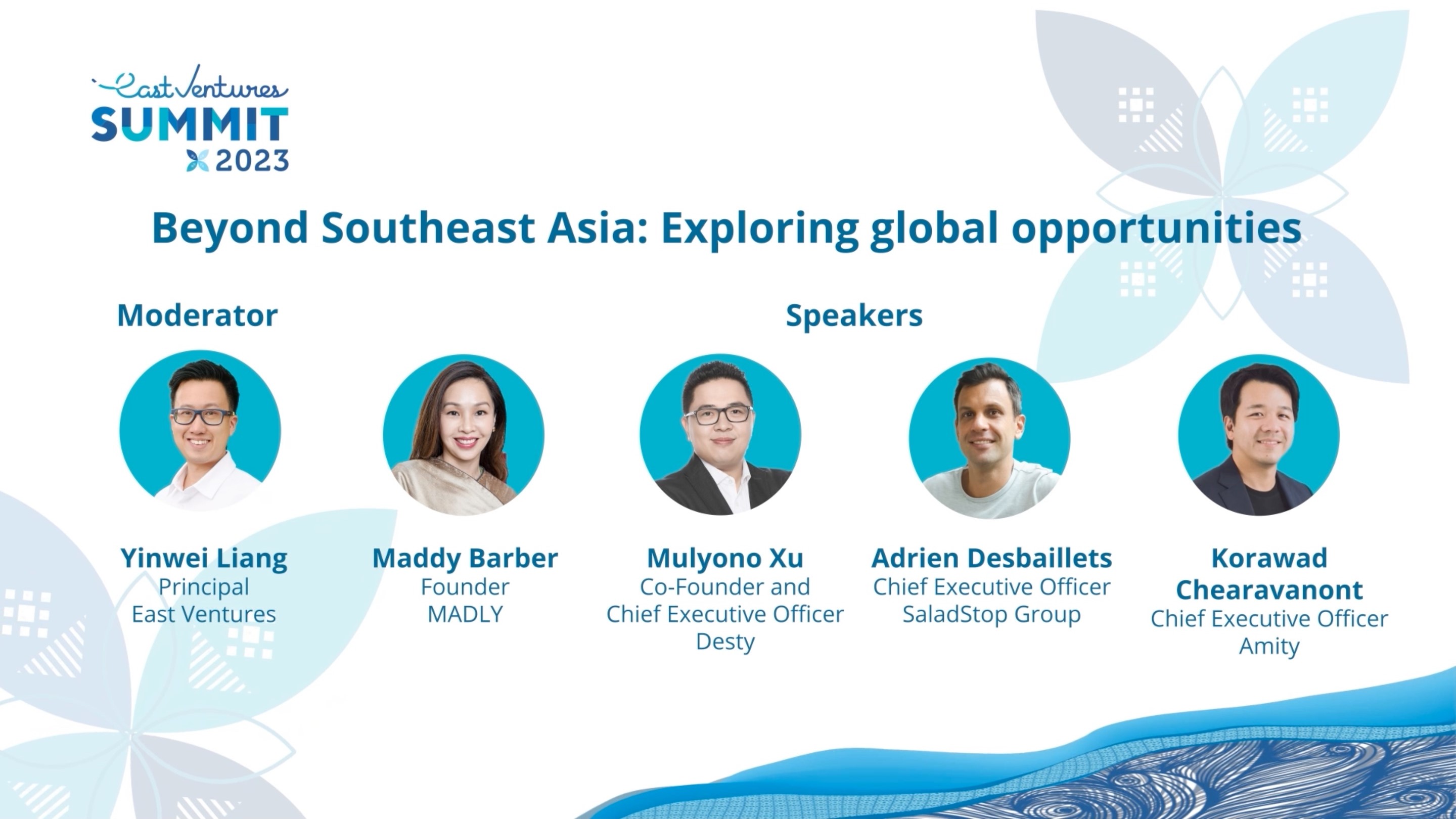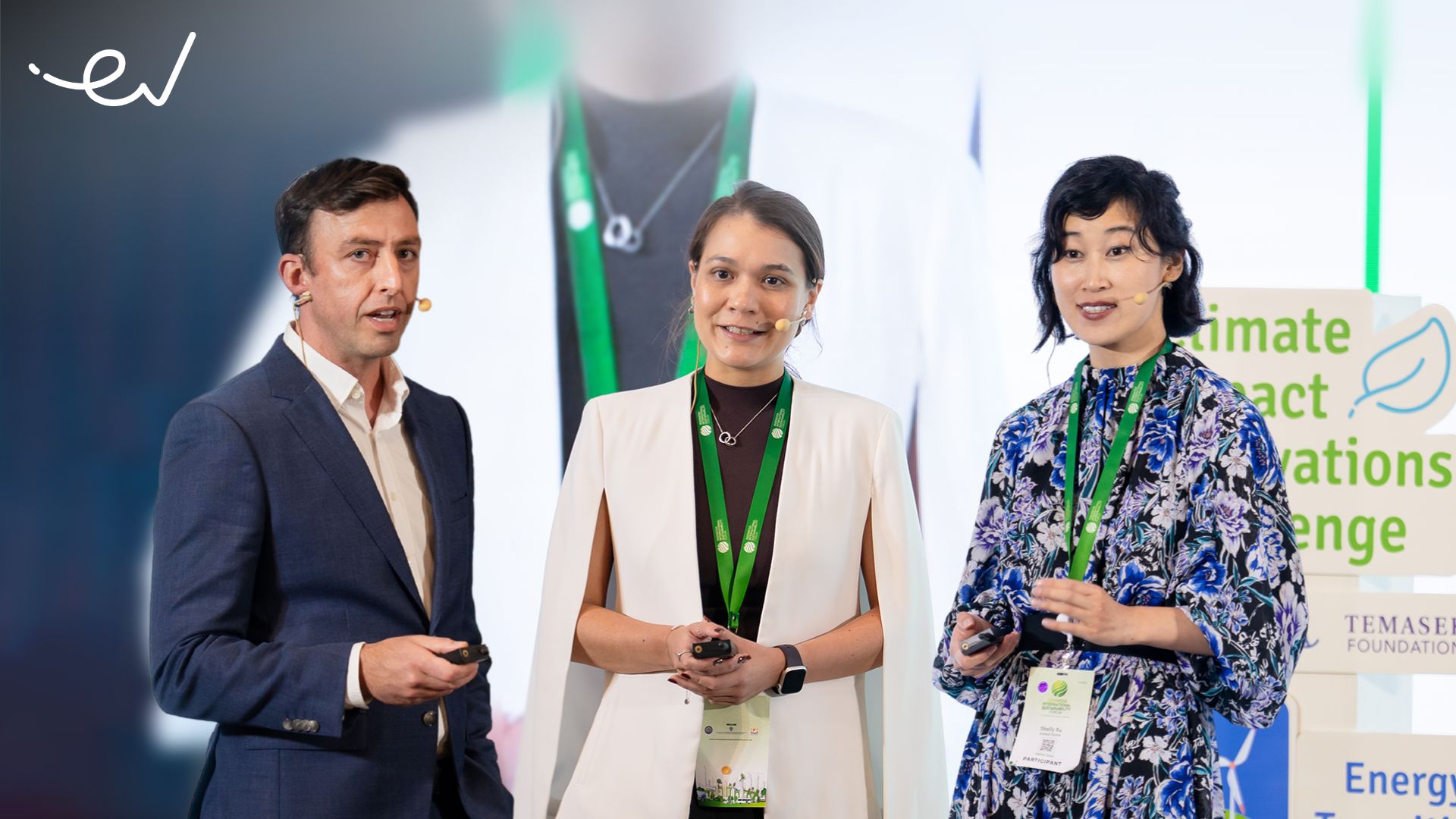Over the past decade, Southeast Asia’s tech landscape has undergone a significant transformation. From budding startups to global expansion, the region is entering its golden era, backed by solid management, operations, and infrastructure.
Seizing global opportunities is now pivotal for success, as highlighted at the East Ventures Summit 2023. In a panel discussion titled “Beyond Southeast Asia: Exploring global opportunity”, four startups founders: Maddy Barber, Co-Founder of Madly; Mulyono Xu, Co-Founder and CEO of Desty; Adrien Desbaillets, Co-Founder and Managing Director of SaladStop!, and Korawad Chearavanont, Co-Founder and CEO of Amity shared their experiences, strategies, and challenges of expanding beyond Southeast Asia.
As of May 2023, the Southeast Asian region has witnessed a remarkable surge in entrepreneurial endeavors, boasting 4,603 thriving startups and 52 unicorns within the ASEAN framework. This unprecedented growth underscores the immense global opportunity for Southeast Asian startups.
Moreover, the impact of the COVID-19 pandemic has significantly intensified the demand for innovative digital services. In this landscape, startups are strategically positioned to shine and meet the surging demand for transformative solutions.
However, the expansion brings challenges like understanding new markets, regulations, and cultural nuances. Success hinges on adaptability, strategic planning, and market understanding. Here’s how the founders overcome the challenges and design their strategies in expanding businesses overseas.
1. Accessing a broader talent pool
Maddy Barber’s jewelry design house, Madly, is embarking on its first international branch in Dubai. Amidst challenges like sourcing skilled designers in Asia, Maddy emphasizes the significance of promoting design education. Going global provides an avenue to tap into a more extensive talent network. Madly’s approach is anchored in creating bespoke designs that align with local cultures and market preferences.
2. Optimizing and simplifying workflows
Mulyono Xu encountered challenges while bridging the gaps between the China and Indonesia teams of his startup, Desty. To overcome this, he utilized an Application Programming Interface (API) integration and emphasized creating efficient workflows with comprehensive documentation. Thorough documentation, including Product Requirements Document (PRD) and Functional Specification Document (FSD), was crucial in eliminating personal issues and blame-shifting, allowing the company to navigate cross-border challenges successfully.
3. Time zone strategy
Korawad Chearavanont positioned the Research and Development (R&D) for Amity in Bangkok and business units in Milan, London, and San Francisco. This layout, influenced by sales needs and time zones, ensures seamless communication and support for American and Asian clients. By strategically distributing operations across different time zones, Amity can maintain continuous communication and provide efficient support to clients and teams across the globe.
4. Adaptability to local market trends
Adrien Desbaillets shared SaladStop! Group’s successful expansion by focusing on adaptability to different markets and addressing Gen Z trends with partners who understand the nuances of the market. Through on-ground research and partner collaboration, they adjusted their cost structures and efficiently expanded into markets like Korea, Japan, and Australia.
Operational efficiency and technology played critical roles in ensuring successful and sustainable expansion. As entrepreneurs navigate the uncharted waters of international growth, their strategic adaptation, cultural integration, and operational excellence draw lessons to thrive globally.
Integrating sustainability into global business strategies
Sustainability now significantly influences various sectors, highlighting its importance for businesses and society.
Maddy’s demand-driven approach focuses on waste reduction, aligning with consumers seeking eco-friendly products. In the food industry, Adrien highlighted SaladStop!’s achievement as Asia’s first net-zero restaurant. He also introduced methods like carbon labeling and reducing construction footprints, emphasizing their sustainable commitment.
In a globalized world, expanding beyond one’s home market offers immense global opportunities for Southeast Asian startups for growth and impact. The insights from this panel discussion underscore that global expansion is not just about conquering new markets; it is about connecting with individuals and communities worldwide while remaining sensitive to diverse cultures and preferences. This approach exemplifies the promising global opportunity for Southeast Asian startups in today’s interconnected world.
The panel discussion can be rewatched on demand on our official YouTube channel.







